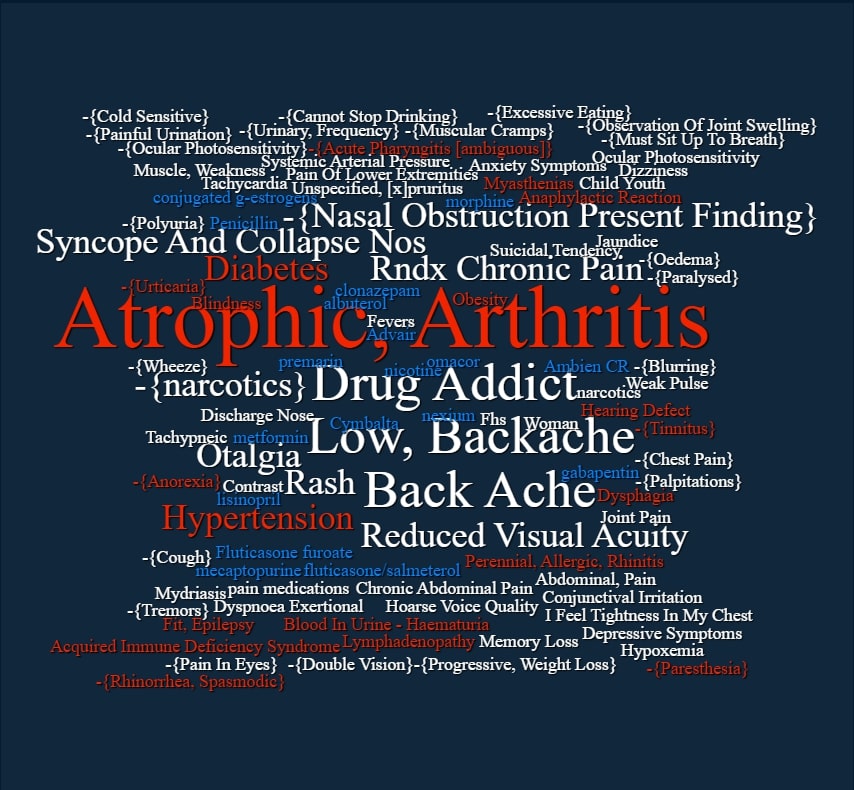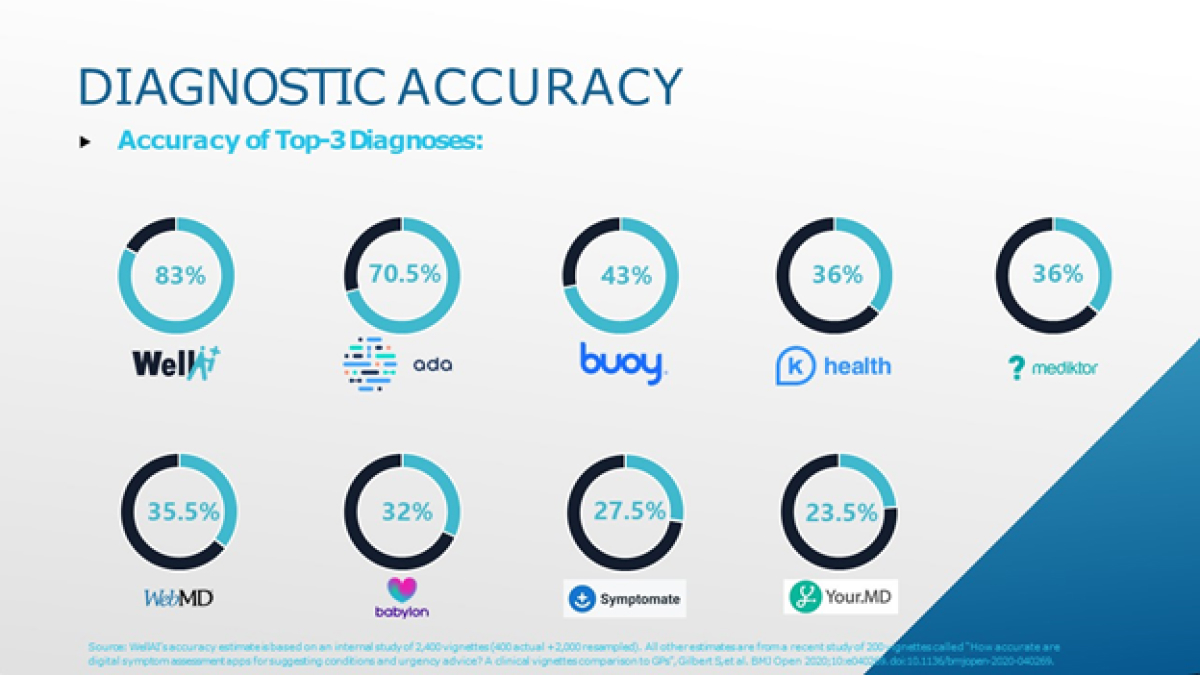Medical Diagnostic/Digital Health Assistant/Engine for Patients/Physicians
In 2020, a group of internationally recognized data scientists developed a COVID-19 research tool (Source: https://www.prnewswire.com/news-releases/wellai-develops-covid-19-research-tool-in-response-to-white-houses-call-to-action-301036993.html). The tool incorporated four neural networks that read and assimilated over 45,000 publicly available medical studies focused on COVID-19 and evaluated relationships between hundreds of thousands of medical concepts. Researchers enter any set of concepts they are interested in and WellAI generates a list of medically relevant concepts. The researcher selects and narrows down the particular concept to delve further into. The International Federation of Clinical Chemistry and Laboratory Medicine (IFCC) conducted a peer-reviewed study of WellAI’s COVID-19 tool and published the results: https://pubmed.ncbi.nlm.nih.gov/32549878/.
WellAI was created with a vision to eliminate the immense asymmetry of medical knowledge between participants in the healthcare industry, with the focus on doctors, nurses, and patients. Customers know almost everything about the car they are about to buy. But they don’t know much about what is happening and, more importantly, what could happen to their health.
Knowledge saves time and saves lives. With initial successes in primary care and urgent care, the WellAI platform is expanding its applications to dermatology, pediatrics, chronic care management and home care and has already proven to help patients with certain types of cancer.

WellAI for Medical Providers enables medical practices/clinics to drive efficiency in light of staffing issues, create priority targeted health communication, and enable higher quality care. WellAI resolves issues related to the increased need for at-home care, overwhelmed front desks, and with thorough diagnostics ensures nurses never skip a critical question and presents physicians with alternative ways to think about a patient's condition.
WellAI’s turnkey platform consists of a Patient Application and Physician Application that can run on any device or is browser-based. It includes configurable features such as:
All of this functionality is packaged in one point/click intuitive Patient/Physician application, plus it is customizable and is white-labeled for the organization. It integrates with many EMR systems (EPIC, Cerner, NextGen, etc), for some functions it will read-write to the system.

The same scientific team realized that they could expand the tool using the same technology in an evolutionary fashion to address a broader spectrum of health conditions. Towards Data Science published an article “3 AI Trends in Healthcare” (source: https://towardsdatascience.com/3-ai-trendsthat-will-revolutionise-healthcare-da4198dbb31d) focusing on the growing presentment of AI in three major areas: EHR, diagnostics, and telemedicine. The growing demand for more precise and intelligent analysis of ever-expanding datasets is evident in these areas. The challenge is that many tools lack the scientific capability to analyze these datasets effectively - going beyond decision trees and chatbots.
The WellAI team, breaking traditional AI boundaries, expanded the baseline tool with four additional neural networks enabling assimilation of over 30 million peer-reviewed medical articles, journals, case studies, and continuing to assimilate new publications as they emerged. This created a multidisciplinary diagnostic solution that addresses practically every known health condition from the common cold to rare diseases. The tool enables physicians and patients to, in a Siri-like fashion, simply speak their condition (how they are feeling). WellAI ‘listens’ and cuts through the white noise of emotion and non-essential context to derive and translate the medical symptoms into a diagnosis. Based on an initial set of symptoms, it will ask logically derived questions to medically clarify how the patient is feeling (much like a medical practitioner conducts patient intake) and arrive rapidly (in less than 2 minutes) at an initial diagnosis. WellAI limits the diagnostic outcome to one or two of most probabilistic health outcomes. WellAI provides a logical and scientifically validated starting point (or a scientific second opinion) for a physician or medical practitioner to begin the process of diagnostic validation and to create a prescriptive treatment plan.
The WellAI solution is presented in two forms. A Digital Health Assistant is an “app” downloaded onto a smartphone, computer, or iPad which a physician, patient, or caregiver can tap open and use anywhere, anytime or as an engine. The engine is essentially the neural net/AI technology which can be repurposed or used on the backend to power or enhance another solution (i.e. a front office workflow screening or EHR enhancement).
Starting in the late nineties, the emergence of online symptom checkers like WebMD began. Today there are numerous publicly available and easily accessed symptom checkers. According to a peer-reviewed study focusing on the efficacy of online symptom checkers, the performance was exceptionally poor. The researchers found not only diagnostic inaccuracy, but also a variability of performance execution. In fact, the performance was found to be significantly below what is accepted within the medical field. (Source: https://journals.plos.org/plosone/article?id=10.1371/journal.pone.0254088). Another study conducted by Ada Health using 200 vignettes (medical scenarios) offered a similar conclusion. While still advocated as a supplement to diagnostic validation, it is with great caution and concern that these online symptom checkers be used for health validation. A comparison of performance between WellAI and some known symptom checkers/competitive tools is below.

A number of clinical diagnostic solutions incorporating AI have emerged. Recently, tools like RecoverX, Artrya’s Salix, Ezra and a host of other solutions have emerged on the market accompanied by large funding rounds and/or great publicity (Source: https://www.mobihealthnews.com/tag/ai-diagnostic-tool). The key difference between these diagnostic solutions and WellAI is that they are extremely focused on one particular area. With the exception of RecoverX, which is essentially an AI interface for another solution, these tools are specialist tools with limited scope, application, and focus. While the performance is excellent, they are generally not designed for general use or public consumption.
Notably for determining performance validation for symptom checkers, only 28 to 200 vignettes were used. A smaller sample encompasses more typical health scenarios and hence develops statistical biases and creates misleading results.
To validate the accuracy and performance of WellAI, more than 2400 vignettes spanning around 500 known diseases were identified and utilized. WellAI’s accuracy estimate is based on an internal study of 2,400 vignettes (400 actual + 2,000 resampled). All other estimates are from a recent study of 200 vignettes called “How accurate are digital symptom assessment apps for suggesting conditions and urgency advice? A clinical vignettes comparison to GPs”, Gilbert S, et al. BMJ Open 2020;10:e040269. doi:10.1136/bmjopen-2020-040269. Additionally, an independent board of physicians were enjoined to prove out WellAI’s accuracy, upon conclusion of the study - a 60% accuracy rate for the Top-1 Diagnosis was determined which increased to 85% or more with the layering of physician expertise. WellAI includes all 69 NIH medical disciplines (also known as 69 NIH’s UMLS semantic types) in its analytics.
In applying Bayes Theorem to Digital Health, specifically to a tool like WellAI - statistically speaking, the greater the amount of information, cross-correlated, and the better the ability to separate the quality from the statistical noise, the more accurate the outcome. Source: https://medium.com/@WellAI/bayes-theorem-for-digital-health-or-how-to-fight-misdiagnosis-with-statistics-29ad6f6229c1
An analytical AI, multi-neural net driven application that has assimilated and processed more than 30 million medical studies, research articles, case studies, journals and continues to ‘learn’ and assimilate new information daily. The algorithms understand and sort medical concepts in order of relevance to other medical concepts. It has resolved the dimensionality problem in machine learning by assigning medical concepts to clusters (factors). The application addresses common ailments, rare diseases, COVID-19, advanced genomics, and, more recently, dermatology and pediatrics. It can accurately diagnose 500 medical conditions ranging from rare conditions to common health ailments.
The Engine is fundamentally a smartphone or computer application that uses a soothing, Siri-type voice to listen, comprehend symptoms and health status. Acting much like “Shaun - The Good Doctor” it will ‘swipe in and out’ of relevant medical information and ask continuing detailed diagnostic questions until it comes to a diagnosis.

WellAI is currently working with primary care and urgent care physicians and is open to working with specialists across medical disciplines and practices. The engine, as currently available, is adaptable to any solution and can enhance existing solutions (such as a pre-existing patient portal or wellness portal, IVR system, front office portal, etc.). It can interface with many EMR solutions (Cerner, Epic, Nextgen, etc.). We are open to co-innovation to integrate and enhance your current solutions (i.e. telemedicine or clinical diagnostics) with our solution.

WellAI’s Digital Health Diagnostic tool presents a more compelling solution for physicians, patients and caregivers in providing a higher quality of care and patient outcomes. It offers a broader and more accurate diagnostic capability and application than online symptom checkers or clinical diagnostic tools. WellAI is essentially a full workflow technology solution for medical offices and hospitals.
With staffing shortages, the tool can drive greater efficiency while providing diagnostic accuracy with respect to patient intake, telemedicine, and optimizing patient flow. As a caregiver or patient tool, it can offset unnecessary practice visits or ER visits. As an engine, it can drive enhanced solutions for practices and healthcare organizations that previously were unimaginable. There are many more use cases that are possible.
WellAI is not a replacement for a health practitioner. It offers validation for diagnosis, eliminates time for understanding the patient’s condition, and enables a laser focus and rapid ability to begin the process of treatment with greater levels of engagement. It is a tool, like an X-Ray machine or thermometer that can support better health outcomes.